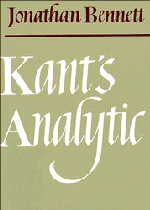8 - TRANSCENDENTAL DEDUCTION: THE MAIN THREAD
from ANALYTIC OF CONCEPTS
Published online by Cambridge University Press: 03 May 2011
Summary
The unity of consciousness
We now turn to the jungle of the Transcendental Deduction of the Categories. Kant's justified discontent with this desperately ill-written chapter led him to rewrite it for the second edition; but the later version, though it helpfully shifts some emphases, is only marginally clearer than the earlier. Attempts have been made to canonize the whole text of the Transcendental Deduction, but the results have been derisible. Far more usefully, Vaihinger and Kemp Smith have explained the unclarity of the first version of the Deduction by the conjecture that it is a collage made up of jottings written down over the years. However this fares as a biographical hypothesis, it is at least backed by some fairly sound critical exegesis. And yet, even if the Transcendental Deduction is reshuffled in accordance with this ‘patchwork theory’, the result, though it shows something like a linear development from primitive to sophisticated attacks on the same problems, is still dreadfully confused. The Deduction is not a patchwork but a botch. Since it contains some good things, however, it is not a negligible botch.
My aim in §§28—31 will be to lay bare certain arguments which are central to the Transcendental Deduction and from which something can be learned. While relating my remarks as closely as possible to the Kantian text, I shall leave many exegetical problems unsolved and all the exegetical debates unadjudicated.
- Type
- Chapter
- Information
- Kant's Analytic , pp. 100 - 125Publisher: Cambridge University PressPrint publication year: 1966



